1988 Countdown #53: Chicago, “Look Away”
(New to the countdown? Catch up here.)
We hear a horribly dated plinkety synth sound; it sounds like somebody got a new keyboard for Christmas 1987 and left it on the preset. On our video screen: a New York City street scene, specifically a Hot Video Babe walking down the sidewalk. She is walking two rottweilers. She is wearing a short peach jacket; it’s unbuttoned, so that we can catch glimpses of the skimpy black outfit underneath. She is styled in an angular way that in this era of MTV signified either “intimidating high-class woman” or “Sheena Easton.”
The Hot Video Babe is arguing with a boyfriend who’s clearly not worthy of her: short, balding, smoking a cigar. The lyrics start: “You called me up this morning, told me about the new love you found.” We quickly cut away from the cigar smoker to a more suitable proxy for 41-year-old lead vocalist Bill Champlin: a young handsome man with bleached hair, moping around an expensive apartment. Bleach Job talks on the phone, pretending to be happy for his ex-girlfriend. He slams down the receiver, and we learn that the art director found an antique rotary phone at the prop house.
Wearing sunglasses and a gray tank top, Bleach Job walks down the middle of the street–New York is pretty tolerant of jaywalkers, but he’s pushing it. An old-fashioned yellow Checker cab, selected by the same art director, pulls up to the curb. A different Hot Video Babe steps out with an armful of packages; as the chorus swells, she drops them into a puddle.
The reasonably catchy chorus: “If you see me walking by / And the tears are in my eye / Look away, baby, look away.” This is another Diane Warren composition (her second in the countdown after Belinda Carlisle’s “I Get Weak”), and although it’s an effective piece of pop craft, it’s also utter dreck. We cut to a nighttime scene: in the back of a limo, Bleach Job (still wearing his sunglasses) is arguing with Hot Video Babe (the first one, I think, although all the women in this video are similarly styled brunettes, so it’s hard to tell).
The limo parks in Times Square, right in front of a Sbarro and a movie theater playing Running on Empty. Alternately waving her hands and holding her head, HVB #1 steps out of the limo. She’s wearing black gloves and what looks like a pink taffeta dress. The limo pulls away, but her dress is caught in the door. She spins around, letting the dress (actually, the carefully draped pink sheet) fall off her to reveal sheer black foundation garments. She looks pissed, rather than embarrassed.
Cut to another apartment, dimly lit, looking down on Times Square nighttime traffic. There are three more Hot Video Babes; like all the other women in this video, they are wearing hot pastel outfits, accessorized with black. Two of them are sitting; the third one pirouettes to the refrigerator and opens it, revealing that it holds no food but does contain an industrial-strength light source on loan from Shea Stadium.
Still nighttime: one of the Hot Video Babes walks down the middle of the street of the meatpacking district. Behind her is a car, tipped over on its side, going up in flames. She doesn’t look back, but strips off one piece of jewelry after another, casting them aside. When she gets far enough away, the car explodes in an impressive fireball.
Dawn. Bleach Job stands on top of a tall building, looking at the Empire State Building. Later, on another balcony, two more hot video babes are playing with a telescope. One of the babes twirls a gold watch around her finger. She dips it in a glass of red wine, and then tosses it over the side of the building. We get reaction shots from Bleach Job, looking up as if the watch landed at his feet, and a third HVB with a bow in her hair, sunning herself and laughing. This is where I gave up on trying to figure out any semblance of a plot; I can’t tell if these women were dating Bleach Job or the cigar smoker or both. Judging by the wholesale disposal of jewelry, either there’s been a bunch of unpleasant breakups or this is a crowd really into conspicuous consumption. And don’t even ask me why that car was on fire.
One more HVB walks down a city street, hair piled high and perpendicular, wearing a hot pink vinyl dress that, unsurprisingly, is coming open at the front. She’s holding a large bunch of flowers, but she’s struggling with them, giving us an opportunity for a closeup of her garters and stockings. She throws the flowers up in the air. Bleachie leans against a wall; the camera pans by him and into a blue-lit nightclub. Three minutes into a four-minute video, we get our first view of the band.
Peter Cetera had been gone from Chicago for three years at this point; replacing him on bass and vocals was the eighteen-years-younger Jason Scheff. Vocals on “Look Away,” however, were handled by guitarist Bill Champlin, who had been in the band since 1981. Judging by this video, he’s still rocking his haircut from 1973. He’s also got a black tank top, a white vest, and exactly two stage mannerisms: bouncing on the balls of his feet and pumping his right fist in the air. We get a quick overview of all eight members of the band; the horn players try to look busy despite not having anything to do on this song.
A Hot Video Babe gets into a hotel elevator, drying off her hair with a towel, wearing a hot-pink bathing suit. There are already three men in business suits there. The doors close and open again; the HVB is pulling an orange jacket over a black bra, implying that she completely stripped down and changed clothes in the elevator. Also, her hair is now perfectly coiffed. One man wipes his brow, another adjusts his tie, the last one fans himself with a newspaper. She leaves the elevator with a smirk.
Obviously, this clip was intended to ramp up the sex appeal of the unphotogenic Chicago; it’s far from the only video on this countdown to do that, just the most relentless. The unusual thing about it is that while other prurient videos of the era (Poison, Van Halen) rely on the stripper trope, the girls in “Look Away” are presented as confident, tough women whose clothes just happen to keep falling off them. So they look more like classic cheesecake illustrations–the sort of stuff you would have seen in 1950s men’s magazines with names like Bachelor or Cad. Even when Chicago are trying to be crass, it feels dated.
Another HVB runs into an open fire hydrant, deliberately soaking herself.
Bleach Job is back on the phone in his apartment, lip-synching the lyrics “I’m really happy for you,” looking a little more sincere this time. In the nightclub, Champlin holds the microphone and looks into the middle distance, wondering how long Chicago can keep giving their albums numbers instead of names.
“Look Away” topped the singles charts for two weeks (putting it in a three-way tie for Chicago’s biggest hit, alongside “If You Leave Me Now” and “Hard to Say I’m Sorry.” You can watch the video here.
posted 24 June 2010 in 1988 and tagged Chicago, Diane Warren. 17 comments

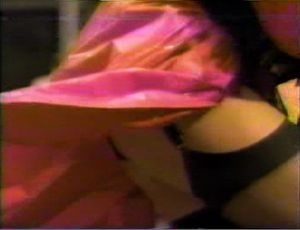
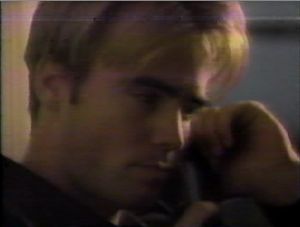
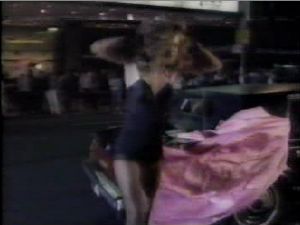
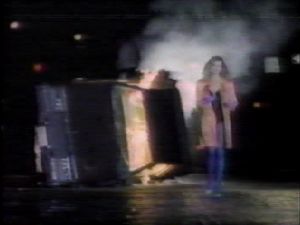
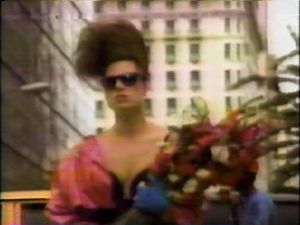
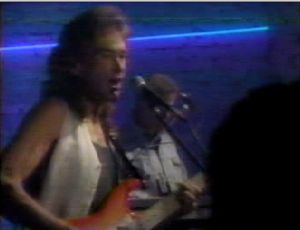
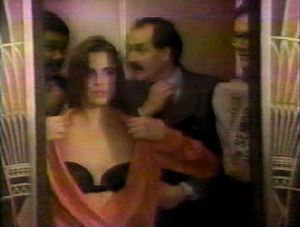


June 24th, 2010 at 7:04 am
This is another Diane Warren composition…and although it’s an effective piece of pop craft, it’s also utter dreck.
When people ask me why I loathe Diane Warren (including fellow rockcrit types who have interviewed her or met her at PopCon and have found her totally charming), I often start with this empty, sub-Hallmark song.
Improbably, “Look Away” was also the Number One Song of 1989 (not 1988, the year you’re covering here) according to Billboard. Because of the magazine’s December–November chart year for year-end tallying purposes, songs that peak the previous Christmas have a habit of topping the next year’s cumulative chart, and Chicago’s peaking in December ’88, plus subsequent months of dayparted radio airplay, gave it an unstoppable data advantage.
“Look Away” was easily the what-the-fuckiest of all of Billboard Number One end-of-year songs. I remember vividly picking up the year-end Billboard at a newsstand in December 1989 (it was my first day home for Christmas vacation from an exhausting first semester in college), flipping immediately to the year-end special section, and being absolutely deflated when this cookie-cutter, Warren-by-numbers, execrable Chicago schlockfest I’d forgotten existed was listed at the top of the list. (I was convinced it’d be something far better like “Every Rose Has Its Thorn” or “Straight Up” or “Like a Prayer.”) As a chart geek, a pop critic and, hell, a carbon-based life form, this song just offends me.
(Check out 20 years’ worth of year-end chart-toppers in the middle of this old Idolator column of mine. Because the column is more than two years old, the only songs needed to bring the list up-to-date are 2008’s Number One, Flo Rida’s “Low,” and 2009’s, the Peas’ “Boom Boom Pow.” I don’t care for either of those songs, but I still hate “Look Away” more.)
June 24th, 2010 at 1:14 pm
Yeah, that this was #1 of the year was indeed a shocker. It did have a solid run at the top of the charts though, and I suppose that helped. I’m guessing over at MTV, it went #2 or #3, owing to getting this high in spite of coming out so late in the year, and that the top spot in December was passed between U2 (“Desire”), Duran Duran (“I Don’t Want Your Love”) and of course, Poison (“Every Rose Has Its Thorn”). But they clearly put up quite a fight.
It was a little hard to tell that it was Bill Champlin on vocals, even though I’d heard him on “Hard Habit To Break”, one of my guilty pleasures by the way.
A little extra MTV Top 100 trivia: Chicago was on the top 100 of 1985 with both “You’re The Inspiration” and “Along Comes A Woman”, both back to back at #76 and #75 (apparently before MTV put in place their policy of separating same artist videos), and Peter Cetera’s “Glory of Love” was #50 on the top 100 of 1986. So yeah, they definitely had history with MTV. It is a little amusing how they tried to capitalize on the hair band power ballad video look here in light of it all.
I can’t believe I find myself saying this, but since I might not be around next Thursday, I kind of hope the next entry will instead be a commercial break, assuming that’s what comes next.
June 24th, 2010 at 3:00 pm
(The next entry is a video–and a much better song than the last couple–but I’ll be on the road next week, so it’ll probably be delayed until July.)
June 24th, 2010 at 3:34 pm
I’m definitely looking forward to #52 as well, and commenting on it to boot.
One other thing about “Look Away” I forgot to mention is that at times I would get it a little confused with the year’s other power ballad megahit from a veteran collective, Cheap Trick’s “The Flame”, which will of course show up much later on this countdown.
June 24th, 2010 at 8:00 pm
“If you see me walking by / And the tears are in my eye / Walk away, baby, walk away.”
That last line should of course be “Look away, baby, look away.” The way Champlin manfully puffs himself up for such a wimpy, self-negating emotion is part of what makes this song, IMO, the worst Number One song of all time. My goodness, is it ever bad.
June 24th, 2010 at 9:32 pm
Fix made; thanks for the catch.
June 25th, 2010 at 3:22 pm
This song is quite bad, but I don’t think it’s any worse than the other treacly ’80s Chicago ballads (e.g., “You’re the Inspiration”). Am I wrong? Was it just that it was a bigger success than those others?
June 25th, 2010 at 4:34 pm
It is cheesy, to the point where it’s earned spots on VH1’s 40 Most Awesomely Bad Breakup Songs and tvtropes.org’s “Narm” pages. (Narm = unintended hilarity, and named after Nate’s embolism scene in Six Feet Under.) You’re The Inspiration, however, was on VH1’s 50 Most Awesomely Bad Songs of All Time, in what was a typically humorous VH1 commentary spot.
I guess the David Foster era is pretty looked down on in general, considering what Chicago was initially known for in particular.
June 26th, 2010 at 1:53 pm
this post (and this video) totally cracks me up. I barely remembered it. Wow.
I’m not defending “Look Away” (although I usually like songs called “Look Away”) but Diane Warren’s track record in 1989 alone includes “Love Will Lead You Back,” “I Get Weak,” “If I Could Turn Back Time” and “Blame It On The Rain.” That’s some fairly high-grade 80s pop.
in my opinion Diane was an advance over the previous Michael Masser/Linda Creed/Holly Knight/David Foster/Narada Michael Walden era of 80s power ballad schlock, which is why she became ubiquitous practically overnight. She wrote great ones and loathsome ones, and apparently couldn’t tell the difference. Wasn’t there a week in 1989 when she had 7 different Hot 100 songs by 7 different artists? including the top 2, which were “When I See You Smile” (which I hate) and “Blame It On The Rain” (which I love)?
June 28th, 2010 at 9:30 am
This song is quite bad, but I don’t think it’s any worse than the other treacly ’80s Chicago ballads (e.g., “You’re the Inspiration”). Am I wrong? Was it just that it was a bigger success than those others?
I’m definitely not a big fan of “You’re the Inspiration,” which is probably their all-time lite-radio gold track at this point (I’ll bet it gets even heavier cumulative airplay than “If You Leave Me Now”).
But “YtI,” gooey as it is, still features Pete Cetera, which makes a difference in my book. His stuff after leaving Chicago was forgettable/lame (the Karate Kid II song, the Amy Grant duet), and their stuff after he left was forgettable (“Will You Still Love Me?”) or worse (the above Warren ballad). But together the whole equaled something more than the sum of the parts. Mind you, that whole was still schlocky.
I’ll just put it out there: Among Chicago’s ’80s schlock, I’m a sheepish fan of “Hard to Say I’m Sorry” and especially “Hard Habit to Break” (same album as “YtI,” and a far superior song/production, IMHO). Both of these tracks had a sort of over-the-top sub–Jim Steinman pomp that really resonated with me. But those tracks were in ’82 and ’84, and the rest of the decade was all downhill for me.
June 28th, 2010 at 12:44 pm
“You’re the Inspiration” is just boilerplate treacle, and easily ignored. Why catapults “Look Away” into its own realm of badness is the way the subject matter – a standard wimp-rock ode to the way the singer’s old girlfriend brings him to tears – is treated with such bombast. Champlin bellows his way through lyrics that Lobo would have found too unmanly, and that’s what bridges the gap between disposable and laughable.
June 29th, 2010 at 10:56 am
Lobo. Ouch, Tom!
I like “Hard to Say I’m Sorry” because Cetera really DOES find it hard to pronounce the word “sorry” (it comes out as SAAAWAAAY) but my fave 80s Chicago has to “Stay the Night,” the one where he wears the Bauhaus t-shirt in the video; in terms of druggy 80s LA paranoia it’s up there with Toto’s “Stranger in Town” and the last half hour of “Boogie Nights.”
I remember not hearing “Look Away” much and being surprised it even reached Number One. These were weird years for Number One hits. 1988 and 1989 were such great years for Top 40, but you wouldn’t know it from looking at the top of the charts. If I remember correctly, both years had 32 different Number Ones, which is a lot. (1974 and 1975 had 35 apiece, which I think is still the record.) “Look Away” was Number One in December 1988, but I barely ever remember hearing it. 1989 was full of great pop but who were Sherriff or Bad English or Michael Damien and why were they at Number One? “Batdance,” WTF? These songs seemed to barely crease the radio, yet they hit Number One. “Look Away” pretty much sums up the madness.
June 30th, 2010 at 10:34 am
These were weird years for Number One hits. 1988 and 1989 were such great years for Top 40, but you wouldn’t know it from looking at the top of the charts.
I could go on and on responding to this (totally apt) comment, but briefly: This is why Soundscan and BDS had to be invented and the charts needed to be blown up in 1991. Billboard‘s payolariffic, bought-and-sold charts had gotten totally corrupt, which explains songs like this drifting to the top.
July 3rd, 2010 at 12:56 am
Those are some damn funny comments nearing the bottom. And I would agree that it was the production that elevated “Hard Habit To Break” above the rest from that decade.
Speaking of Peter Cetera, did any of you know, no, strike that, would any of you believe he showed up on Tim and Eric Awesome Show, Great Job, in a parody of the type of soundtrack songs he might be responsible for? Funny stuff.
July 7th, 2010 at 6:54 am
Yet another belated comment on this post: On the new (dated 7 July) Slate Culture Gabfest, esteemed pop critic Jody Rosen closes the show with an endorsement of the Cetera Karate Kid II song I called forgettable/lame above, “Glory of Love.” He’s recommending it as a rejoinder to the show host’s endorsement of Mary Lou Lord.
I admire Jody’s fight for the poptimist cause of exceptional schlock, but I still prefer Cetera’s Chicago work, especially “Hard Habit to Break.”
July 7th, 2010 at 2:51 pm
Yeah, that and “Hard To Say I’m Sorry” are preferable earworms, especially considering the latter’s jazz-fusion outro throwback to the band’s earlier stuff.
Here’s the self-parody Peter Cetera did on Tim and Eric, Little Danson Man:
http://www.youtube.com/watch?v=umgUDUxHKfY
It’s the last part of the sketch, which is thankfully rather funny.
November 24th, 2019 at 4:08 pm
I’m trying to find out who directed the music video for Look Away by Chicago.